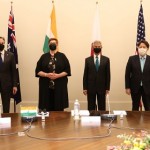The February 11 meeting of Quad foreign ministers in Melbourne reviewed recent developments and prepared for the upcoming third summit. While it kept diplomatic attention focused on building cooperation between Australia, Japan, India and the United States (U.S.), it did not release new information. The ministers reiterated the shared vision to advance “a free and open Indo-Pacific.” The joint statement revealed that the four governments were pursuing an ambitious work plan covering diverse domains such as maritime security and counterterrorism, besides addressing “regional challenges”. So, if Quad is not about countering China’s growing aggression in the region, then what is it?
It is conscious of that central challenge in the Indo-Pacific, made clear from references to adherence to international law, the United Nations Convention on the Law of the Sea, the maritime rules-based order in the navigation and overflights.
The message from Melbourne was duly received in Beijing, which lost little time in criticising Quad as “a tool to contain and circle China, and preserve America’s hegemony.” U.S. Secretary of State Antony Blinken explained that their, “objective is to give our region strategic choices and to build the resilience of all states.” India’s clear briefing on its border conflict with China and its calibrated disclosure to media thereof, exposed the violation of written agreements by China.
This grouping is engaged in a constructive campaign to win the hearts of the region’s people. The Association of Southeast Asian Nations (ASEAN) figures high on the list of the countries it is keen to cooperate with. The ministers’ plan to advance practical implementation of ASEAN’s outlook on the Indo-Pacific, although it remains unclear on how this will be done, considering the ASEAN nations’ vulnerability to China’s military and economic power.
The ministers reviewed progress on vaccines, the climate crisis, critical technologies, infrastructure, cyber security and space, education and people-to-people relations. Not much information was shared with the public, except on two scores.
First, it was disclosed that the Biological E Ltd facility in India was set to produce “at least one billion” vaccine doses by the end of 2022, with the first batch being delivered by June. The success of Quad’s Vaccine Partnership is critical for its credibility.
Second, people-to-people relations, which are celebrated as “Quad’s greatest strengths” will receive a boost, given a new exchange programme by the U.S. in cybersecurity, maritime security, countering disinformation, and promoting transparency in governance.
Two political issues drew attention. First, the absence of reference to the escalating Ukraine crisis in the joint statement was noted. External Affairs Minister (EAM) S Jaishankar explained that Quad was focused on the Indo-Pacific (not Europe), and that India advocated diplomacy to resolve differences over Ukraine.
Second, on Myanmar, the ministers crafted a shared articulation of concern, including South and East China Seas, and freedom of support for the ASEAN Five-Point Consensus and the need for Myanmar’s swift return to democracy. But India’s differences with the U.S. and Australia on sanctions against the military government surfaced. Jaishankar said firmly. “…. we don’t follow a policy of national sanctions.” Thus, India’s adherence to “strategic autonomy” was on full display.
Challenges facing Quad are formidable, a major being on-ground consolidation and enhancement of trade, technology and development cooperation. On political questions they should be content with a marked policy convergence rather than aiming at unanimity on every issue. The conclusion is clear: Quad powers are strengthening their habits of cooperation.
However, concerns remain about the Joe Biden administration’s capability to multitask in different geographies in the aftermath of Afghanistan withdrawal and hysteria over Ukraine. A senior administration official observed that the U.S. government was “very confident of our ability to walk and chew gum at the same time.” Not a wise choice of phrase under the circumstances.
This article was first published in Hindustan Times.
Rajiv Bhatia is Distinguished Fellow, Foreign Policy Studies, Gateway House.


